The League of Extraordinary Gentlemen

The protagonists of the first two volumes, and the most iconic League. The leaders of this league, Mina Murray and Allan Quatermain, play an active role in shaping the League's activities of the 20th century as well, working with associates like Orlando, Thomas Carnacki, A.J. Raffles, Andrew Norton, Janni Dakkar and Galley-Wag.
Associated Tropes:
- Anti-Hero Team: Each one of them, to varying degrees, is a hero with flaws and vices.
- Badass Normal: The majority of Britain's League members had no supernatural abilities and relied of experience and skills gained during their own adventures. In fact, one of the reasons the first Murray League was so successfull was because it featured the powerhouse Edward Hyde, and the invisibility of Hawley Griffin.
- Deconstructor Fleet: Of the superhero team genre as having such a wildly diverse team of people with varying powers, philosophies, and even biological makeup proves to be the ultimate undoing of many iterations as their members can barely work together and only barely scrape by, if that.
- Dysfunction Junction: Practically everybody in each incarnation of the team has issues that frequently put them at odds with their teammates. Considering that all of them are characters from wildly different stories by authors in different styles, it would be surprising if it were any other way.
- Expy: The group was originally conceived as the Justice League of America in Victorian Britain. The League eventually evolved over time to have its own distinct identity completely separate from the JLA.
- Faking the Dead: Everyone save Mina, since they're supposed to have died in their original stories. In universe, Mina and Allan are disturbed at the implication of a government agency so comfortable with this kind of subterfuge. This is taken to the levels of faking the death of Moriarty at the expense of Sherlock Holmes who survived by chance.
- Five-Man Band: Mina Murray is the established Leader, Allan Quatermain is her Lancer, Nemo is The Smart Guy, Hyde The Big Guy (while Jekyll has some elements of The Heart), Orlando is The Heart (half of the time, anyway), and Griffin is the Token Evil Teammate.
- Landmarking the Hidden Base: For most of their history, they had a separate hidden quarter in the British Museum.
- My Name Is Not Shazam: They are not actually called the League of Extraordinary Gentlemen. They are properly known simply as "the Murray Group".
- Politically Incorrect Hero: Hyde refers to Captain Nemo as "darkie", while Captain Nemo has a strong hatred of the English. Mina herself is somewhat condescending and elitist both towards foreigners and British people of the working class, though she grows out of this by the mid-20th century.
- Precursor Heroes: When M in Vol. 1 compiles the League he states that it's been done before. The backstory expands on the adventures of the first League founded by England by Queen Gloriananote and was led by Prospero, a second league in the 18th Century was led by Lemuel Gulliver. Keepsakes and paintings of their adventures are on display in their headquarters.
- Moore himself noted that the concept of a Crisis Crossover of several fictional characters goes back to Jason and the Argonauts and Orlando himself notes that The Trojan War was conceived by the Greek Gods largely as one Grand Finale for their out of control "heroes".
- Psycho for Hire: The original league includes both heroes like Mina Murray and Allan Quatermain and characters who are villainous like Hawley Griffin, Edward Hyde (the "good" Dr. Jekyll is hired mostly for the uses of his Superpowered Alter Ego) and Jules Verne's Anti-Hero Noble Demon Captain Nemo would certainly be considered a terrorist today. Even a "good" guy like Allan Quatermain is a Mighty Whitey imperialist from the modern perspective.
- Public Domain Characters: All of them are in the public domain, having originated from 19th century literature.
- Ragtag Bunch of Misfits: It's a miracle any of the members of the League manage to function as a group.
- Sociopathic Hero: Hyde and Griffin both have no problems hurting and killing people to accomplish their goals.
- Teeth-Clenched Teamwork: Initially. Especially the anti-English Nemo, who serves alongside imperialist adventurer Allan Quatermain. But for the most part, the team get on better with each other than they do with their handlers MI5.
- Useless Protagonist: By Century, the League is so inept and powerless God has to personally step in to eliminate the Moonchild, who was actually little more than a drugged out recluse who only reemerged when Mina and Orlando cornered him.
- What Kind of Lame Power Is Heart, Anyway?: Mina and Allan set alongside the original Victorian League are underwhelming, as they are normal people in comparison. Much of Mina's second League suffer from having no remarkable abilities (Mina, Allan and Orlando are all ageless but not invulnerable or fully immortal, and Thomas Carnacki only has limited clairvoyance) and are relegated to defending themselves with pistols and swords.
- Wicked Cultured: They are appropriately named in that they personify gentlemanly excesses rather than virtues.
Murray's First League (1898)
Mina Harker, Oodles O'Quim, Vull II
- Source: Dracula by Bram Stoker.

The leader of the league, Mina is a mysterious woman with "a past" involving a certain foreigner. She's the recurring leader of the league in all stories but the Nemo trilogy.
- Action Girl/Action Survivor: Smacks "Jimmy" in the face with her purse (which contains a brick) when he tries to put the moves on her. She doesn't fare as well against Emma Peel in The Black Dossier, who judo flips Mina then kicks her in the face, and is savagely beaten by Griffin in Volume 2. In general, as a leader she doesn't get involved with violence and killing but rather leads by temperament, intelligence and initiative, showing a gift at organization and management.
- The Ageless: After bathing in the pool of immortality at Kor, she doesn't age.
- Ascended Fangirl: Of Allan Quatermain. She's immediately disappointed but later recovers her crush when Allan gets his act together. They become lovers in Vol 2.
- Badass Normal: A dainty, slightly-built music teacher rubbing shoulders with the likes of Captain Nemo and Edward Hyde!
- Better the Devil You Know: When she confronts Fantômas underneath the Paris Opera House Mina finds him to be extremely horrible, more horrible than Dracula ever was to her.
- Blemished Beauty: In the second story arc, after Quatermain has sex with her for the first time, he is taken aback to see her neck completely Covered in Scars (given to her by Dracula himself). She is offended and gives him the cold shoulder until he explains that his late wife had burn scars all over her own neck and he's astounded she shares it with the second woman he's ever loved. Romance ensues.
- Casual Kink: Mina begs Quatermain to bite her during sex. She also gets aroused when Allan licks her scars on the neck, left by Dracula.
- Chickification: She's a lot more vulnerable in Century: 1969 than we've seen her before. Explained as a result of the strain of being immortal finally starting to catch up with her. It's true she was a Damsel in Distress in her source material, but that situation wasn't entirely on her own fault.
- Closer to Earth: She's probably the closest thing the League has to an Only Sane Man. The supplemental stories, even the ones set in space, keep reminding us she's a music teacher.
- Deadpan Snarker: She will occasionally make remarks about her teammates not making sense.
- Deconstructed Character Archetype: She's the heroine of Dracula, but here she is a divorced ex-Music Teacher, a depiction in contrast to the loving marriage we see in the narrative of the book. It also heavily subverts
 Angst? What Angst? with her, while she acts cool and collected, she is secretly scarred (mentally as well as physically) and traumatized by what happened to her.
Angst? What Angst? with her, while she acts cool and collected, she is secretly scarred (mentally as well as physically) and traumatized by what happened to her. - Empowered Badass Normal: After dipping in the pool of immortality in Kor, she and Allan Quatermain become functionally immortal.
- Faux Action Girl: She's introduced as an iron-willed Lady of War. By the end of the first book, she's begging Allan to save her. In the second book, she's nearly raped and serves as little more than Allan's love interest. Any strength she may have had is gone.
- Freakiness Shame: She is ashamed of her scars from her encounter with Dracula and always keeps them covered with her iconic scarf, even while otherwise nude.
- Heroic BSoD: After Century 1969, she's become a wreck over her failure to stop Oliver Haddo from carrying out his plan.
- Ice Queen: Towards Allan Quatermain and the rest of the League at first. Justified as from her view, she's a middle class divorced woman who is asked by the government to associate with criminals and deviants, including an unashamed sex offender like the Invisible Man.
- Immortality: In Century, she has become immortal.
- Innocent Bigot: Starts out this way, though it's also a case of
 Values Dissonance as she's actually fairly liberal for the Victorian era. That said, she says some very rude things on occasion, especially some of her notes in The New Travellers Almanack, where she occasionally makes some pretty racist and classist remarks about foreign societies and even lower-class British citizens. After becoming immortal, she makes a serious effort to keep up with the times, but this has mixed results.
Values Dissonance as she's actually fairly liberal for the Victorian era. That said, she says some very rude things on occasion, especially some of her notes in The New Travellers Almanack, where she occasionally makes some pretty racist and classist remarks about foreign societies and even lower-class British citizens. After becoming immortal, she makes a serious effort to keep up with the times, but this has mixed results. - Lady of War: She will go into battle when she needs to.
- May–December Romance: With Allan, who is older looking but she's actually older than him.
- Ms. Fanservice: Has become this by the 1960's as she tries to keep up with the times.
- Pimped-Out Dress: She's worn a few, given what was expected of high ladies at the time.
- Sympathy for the Devil: She tends to feel sorry for monsters like Edward Hyde. She also reveals she felt this way for Dracula, that she did feel attracted to him and feels guilty for his death. The guilt is so bad she hallucinates the Count in bat form accusing her in 1969, nearly 80 years after the incident.
- Totally Radical: Allan and Orlando makes fun of her attempts to fit in the 60s. Although for her part, she was trying to fit in to her times after several decades of speaking in increasingly Antiquated Linguistics. In earlier times, a lot of contemporary figures she meets, including Sal Paradise from Jack Kerouac's On the Road, note that there is something old-fashioned about her.
- Trauma Conga Line: She endures this a lot but she also survives and heals from it far better than the rest of the league.
- Unresolved Sexual Tension: With AJ Raffles, as the two get along well and even walk away from their meeting with Norton arm in arm, but his death in WW1 and her relationship with Allan and Orlando means they likely never got a chance to act on it.
- Vampire Bites Suck: "Not quite the two discreet puncture marks of legend, are they?"
- Who Wants to Live Forever?: By the end of the Century trilogy, she's grown weary of not being able to die.
- Women Are Wiser: She's generally the calm, sane, rational one in contrast to the messed-up Jerkass male heroes.
- Your Worst Memory: Mina has troubled memories of her encounter with Dracula, and grows extremely agitated whenever the experience is brought up. As such, getting drugged, nearly-possessed and ending up with a faceful of half-suffocated bats at a live rock performance doesn't do her any favors - given that she perceives them as Dracula attacking her again.
- Source: The works of H. Rider Haggard.
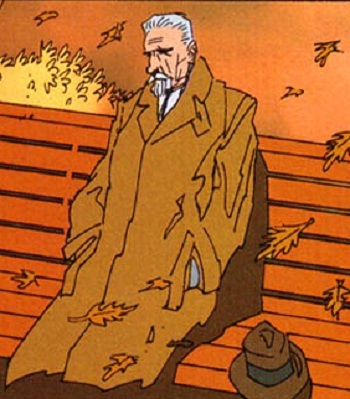
Once a national hero, now an elderly drug addict, adventurer and explorer Allan Quatermain finds new purpose in the Murray Group.
- The Ace/Broken Ace: A recurring problem with him is living up to his reputation of being a highly skilled adventurer.
- Adaptational Badass: The comic portrays him as an Adaptational Wimp, but in the film, he’s far closer to his original portrayal in the comics, a badass who lacks the opium addiction of his comics counterpart and is as every bit a Great White Hunter as he was in his youth.
- Adaptational Wimp: He's imagined here as a timid, strung-out old junkie who is often ashamed of himself. Even when he regains some of his old verve, he's never quite the bold and confident adventurer he is in the original. While it's true Quatermain became more vulnerable throughout his original stories he never sunk to the levels he is here. Averted in the movie.
- The Ageless: Thanks to bathing in Kor's pool of immortality, he becomes youthful and no longer ages.
- Badass Decay: He periodically undergoes this, being dependent on drugs and increasingly reliant on Mina.
- BFG: His elephant gun.
- Broke Your Arm Punching Out Cthulhu: He puts up an impressive fight against the Antichrist, but at the cost of getting horribly killed.
- Deathless and Debauched: In the finale of Century: 1969, Mina's disappearance prompts a disastrous relapse on Quatermain's part, this time escalating to heroin: he ends up so dependent on the needle even Orlando gives up on him after catching their former friend trying to sell Durandal for drug money. When he next appears in Century: 2009, Quatermain has been reduced to a homeless Addled Addict.
- Deconstructed Character Archetype: Of the Action Hero character in modern fiction. His primary function in battle is to shoot down things with a gun which along with thinking on his feet is his main skill. This leads to problems because he needs a big adventure to be a hero and without one he's a drug addict who relies heavily on Mina.
- Deconstruction: Rather than the stereotypical Great White Hunter, he's initially The Load of the League because of his crippling opium addiction, rather than the sure hero of popular imagination and he constantly relapses into his old behavior.
- Fountain of Youth: He becomes significantly younger after bathing in the immortality pool of Kor.
- Great White Hunter: He is a heroic big game hunter.
- Heroic Sacrifice: He sacrifices himself to face the Antichrist in Century 2009.
- Immortality: In Century, he and Mina have become immortal.
- The Lancer: He serves as second-in-command to Mina.
- Last of His Kind: His death at the end of Century 2009. His passing marks the end of the heroic male character who represented real virtues, rather than the false ones of James Bond and Harry Potter, who have become the popular adventure heroes of modern times.
- The Load: His drug addiction is a constant problem and he relapses badly after Century Vol 2 when Mina disappears after the Hyde Park concert.
- Losing the Team Spirit: At the end of Century 2 and Century 3, he has given up the League, becoming a homeless addict. Even meeting Mina again doesn't convince him to come back. He does pull a Big Damn Heroes moment, but he dies.
- Mighty Whitey: One of the archetypes for this kind of character, though Moore noted that the original contained a lot of Unbuilt Trope which he brings back in this book.
- Nailed to the Wagon: He gets locked in his cabin to purge the opium from his system, though his addiction would last another issue. Cruelly, his cabin was aboard the Nautilus, so only half of what he saw were hallucinations.
- Politically Incorrect Hero: Initially he is this. But he loses that during his collaboration with Captain Nemo, becoming less of a colonialist hero than before, even criticizing England's role in the Mahdi crisis.
- Pretender Diss: He's on both ends of this. When facing Professor Moriarty at the end of Vol. 1, he is told Sherlock Holmes thought him "a weakling" and that he's a poor successor as England's most beloved public hero compared to him. In The Black Dossier, Quatermain expresses the same sentiment to James Bond regarding him as a poor successor of the "adventure hero".
- Tsundere: He very often clashes with Mina in Volume 1, with Mina coming to the conclusion that Allan hates her and takes every opportunity to make his opinion of her known. Dr. Jekyll refutes this and tells her Allan's behavior looks more like he's in love with her.
- Who Wants to Live Forever?: Eternity's not so much fun when you have to struggle with a drug addiction.
Prince Dakkar
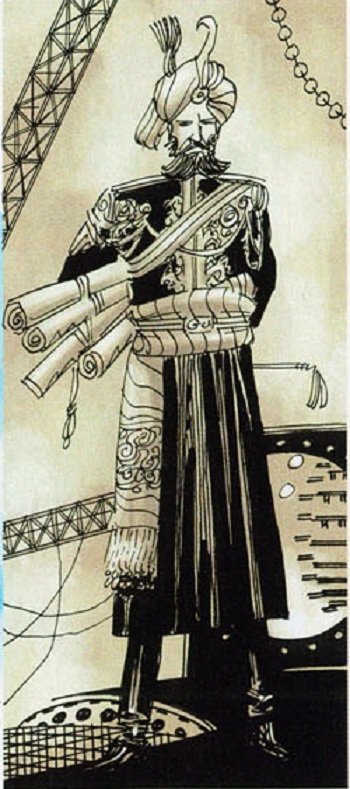
A Sikh pirate, and captain of the Nautilus.
- Adaptational Villainy: Moore's Nemo voices racist epithets towards "Mohammedans" in Book 1 when he and Mina are rescuing Allan from Africa. While such an attitude would not be unknown for Sikh aristocrats of Nemo's background, Jules Verne's Nemo explicitly makes it clear he is a descendant of Tipu Sultan of Mysore, a Muslim ruler (who was a real-life Emperor Scientist who invented and used rockets and developed automatons), and he cites his ancestor with pride. On some level, Moore is a little more authentic than Verne (in that Verne never made it clear how a Sultan of Mysore, which is in South India, would be related to a Sikh Prince of Bundelkhand, from North India) but on another level, it is misrepresenting the Nemo of the books.
- Ax-Crazy: Has his moments of being psychotically violent. Quatermain comments that he's somehow worse than Hyde.
- BFG: His rapid-fire harpoon gun.
- Cool Ship: The Nautilus is an awesome sea vessel.
- Enemy Mine: A complex example. He was a revolutionary in the Indian Mutiny of 1857, then a N.G.O. Superpower and Science Hero who terrorized English ships, but becomes part of the League created by the British Empire to combat even greater threats (albeit with Teeth-Clenched Teamwork and barely repressed contempt).
- Even Evil Has Standards: While he is a ruthless terrorist vocally committed to killing as many Englishmen as creatively as possible, he draws the line at using poison gas. Or bioweapons.
- He's also sent into a murderous rage and appears to lose any and all respect for Hyde when he finds Griffin's very mutilated corpse.
- Go-Karting with Bowser: How he views his collaboration with the English (and how they view theirs with him.)
- Jumped at the Call: In Vol 1, he and Allan briefly bond, and Nemo confesses the real reason he joined the League was that he was searching for another adventure.
- Meta Origin: The science heroes that appear in Heart of Ice all express how Nemo's technology was what inspired them to take up similar ventures.
- More Dakka: His rapid fire harpoon gun.
- N.G.O. Superpower: His Lincoln Island commune of Pirates and Renegades combined with his modern submarine make him The Captain of his Private Army. He's an exiled Prince of Bundelkhand and after the Mutiny, he gives up all remaining ties to any nation or ideology though he reserves animosity towards the English because It's Personal.
- Noble Bigot: VERY prejudiced against the English for the understandable reason that he was a former revolutionary during the Indian Mutiny of 1857. He also has biases against Muslims to a lesser extent. Though he flip flops, he admits to admiring English resolve in the face of Martian invasions and comes to respect Mina Murray and Allan Quatermain greatly.
- Noble Demon: A more accurate description of his character. He is not a conventionally good person by any definition but he has a strict code of honor he does abide by and has many Pet the Dog moments along the way.
- Older Than They Look: His dark hair, better health, and flattering clothing obfuscate how he's almost as old as Quatermain.
- Pet the Dog: He rescues a young Jimmy Grey during the invasion of London after his parents are killed when the Martians attacks the railway bridge. He even tries to comfort him; apparently even Nemo can't quite hate English children, no matter how much he despises the nation itself. Grey would eventually build his own underwater vessel as an adult, which was part of the abysmally failed postwar version of the League, though he had more success on his own.
- Politically Incorrect Hero: In addition to his aforementioned prejudice against Muslims, he also expresses very misogynistic views, putting him at odds with Mina at first. Although his views are not any worse than that of Victorian Englishmen who are also very condescending to Mina.
- He changes at the very end, nominating Janni as his successor despite having a Heir Club for Men attitude for most of his life, but for Janni it's too late and he dies Reformed, but Rejected. Janni does take up his cause anyway.
- Pre-Mortem One-Liner: In Volume I, he says this before killing a bunch of people."Come forward! Come forward, men of England! Tell the gods that Nemo sent you!"
- Resign in Protest: He is enraged when he learns the British government killed off the Martians by deploying biological weapons in a city, and quits the team on the spot.
- The Smart Guy: He's often the most intelligent and resourceful of the group.
- Steampunk: All his technology evokes highly advanced 19th-century technology.
- Token Minority: In accordance with his backstory given in The Mysterious Island, he's Indian. Moore and O'Neil made him a Sikh and gave this version of the Nautilus detailed Indian motifs.
- Also on a wider note, he is the only character outside of English literature to be part of the League, being a character written by Jules Verne (a French author).
- Truer to the Text: His background as a Sikh Prince and a N.G.O. Superpower ruler of his own island nation gets restored from The Mysterious Island, in a sharp departure from the European and White Captain Nemo played by James Mason which was previously the most influential take on the character.
- Well-Intentioned Extremist: Though he seems to have grown more pragmatic by the times of the comic.
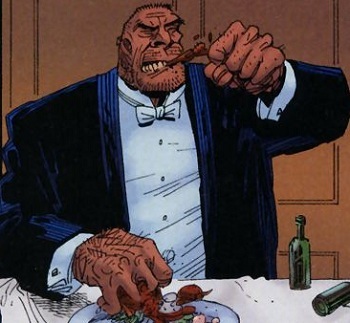
Since his apparent death, Hyde has evolved from the pale, dwarfish figure described in the original novella, to a massive ape-like creature. Also, he no longer needs his potion to transform. Any stress will do. Basically the Hulk in Victorian times.
- Adaptational Badass: In the original book, Hyde is a "dwarfish" man who is sometimes comical to look at and whose personality swings between bold and timid. In the comic, he's a towering juggernaut with Super-Strength and Super-Senses as well as a powerful personality. Jekyll admits in the comic Hyde used to be smaller than him, but that Hyde grew as that personality gained dominance. Both these changes can be somewhat justified based on an interpretation from the original book, where it is mentioned Hyde grew in "stature"; that can be interpreted in literal size which could make him grow to the comics proportions or just in terms of becoming the more heartier persona (at first Jekyll was a hearty man, Hyde the sicker smaller man). After the first transformation, Stevenson writes: "There was something strange in my sensations, something indescribably new and, from its very novelty, incredibly sweet." This could be interpreted as Hyde having somewhat different senses from an ordinary person.
- Armored Closet Gay: Jekyll was in such a panic about jerking off to other men he created his potion to separate his "sins" from himself.
- At Least I Admit It: His main beef with Jekyll. Despite the fact that he is a monster, he knows full well what he is and has no compunctions about letting others know it.
- Ax-Crazy: Hyde is not invariably a murderous lunatic. But when he's in a murdering mood, gore abounds.
- Back from the Dead: He's been brought back to life in the Distant Finale of Tempest. He's implied to be a clone as he mentions seeing the skeleton of the original Hyde, and calls his life in space all he's ever known.
- Beast and Beauty: Hyde reveals a crush on Mina in Volume II.
- Because You Were Nice to Me: Hyde eventually falls in love with Mina because she's the only person who didn't treat him like a monster. He bids her goodbye before sacrificing himself.
- The Big Guy: As Hyde — both literally and in terms of team dynamics. One variation from the source material is that Jekyll has grown ever more miserable and sickly over the years, while Hyde has grown both huge and vigorous.
- Big Ol' Eyebrows: He's got a hairy, scowling, ape-like face, so his eyebrows are prominent.
- Bizarre Alien Senses: Edward Hyde can see people's body heat including Griffin's.
- Blue-and-Orange Morality: Hyde has a set of principles that are quite bizarre by human standards and are only truly understood by him.
- Boisterous Bruiser: A murderous, temperamental example, but he's still the only member of the League who usually regards their adventures as a rollicking good time.
- Can't Act Perverted Toward a Love Interest: Played with when concerning his relationship with Mina. He's a Chivalrous Pervert towards her with his final requests before being killed by the tripods. And earlier in Volume 2, he admits to having considered just raping and killing her like any other woman he's done in in the past but realized he would feel immense suicidal guilt if he ever went through with it.
- Chekhov's Skill: One panel in volume one shows that he can see Griffin through infrared. This is majorly significant in Volume 2.
- Cluster F-Bomb/I'll Kill You!: In some moods he's barely verbal and says little other than death threats littered with foul language.
- Deconstructed Character Archetype: Mr. Hyde is essentially the Hulk, which Moore notes is the literary origin of the Marvel character. This is partially justified since it is noted that Hyde did grow through Stevenson's original story and he could conceivably have achieved Hulk proportions if he and Dr Jekyll lived long enough. Even Hyde being able to see and smell Griffin could be justified, because Dr Jekyll's account in Stevenson's book speaks of new sensations and how the world seemed different when he changed into Hyde. That Mina finds Mr Hyde terrifying but far from the worst she has seen is also justified. Stevenson points out that Hyde is natural, though representing the very worst in nature. Bram Stoker points out his Dracula is utterly unnatural. There is, though, no hint in the Stevenson's book that Hyde was particularly xenophobic, like Moore's version. Also, while Dr Jekyll says the sins which embarrassed him terribly were no worse than what some men might have boasted about, it was probably a little bit more than not returning a borrowed book and occasionally masturbating over homosexual fantasies, as Moore's Hyde claims.
- Depraved Bisexual: He's attracted to Mina, yet he later rapes Griffin, so he's definitely this. Unless that was Hyde's idea of some perverse karmic justice. Though, as stated in other examples, Hyde was partially born from Jekyll's panic about being attracted to other men.
- Depraved Dwarf: In Volume II he reveals he once was a dwarf as in the original novel.
- Even Evil Has Standards: In a 'sort of' example, Hyde does not appreciate what Griffin the Invisible Man has done regarding either Mina or selling everyone out to the Martians... but his response is even worse. Here, it's less because Hyde would never do such a thing (it's suggested he already has, many times), it's because he has some kind of regard for Mina personally.
- Expy: With his two personalities, his ability to become the hulking Mr. Hyde just with an emotional trigger, and Mr. Hyde's Super-Strength, he makes a full circle of expies, being one to the Hulk, which is an expy of the original Dr. Jekyll and Mr. Hyde.
- Extreme Omnivore: Hyde ends up eating a Martian alive.
- Faux Affably Evil: Whilst not evil, he's a perfect example of this with his Blue-and-Orange Morality, frequent dog shooting, and his attitude. The most notable example of this is where he maintains a polite demeanor, observes the London cityscape, and discusses how lucky and chipper he feels whilst he pummels and rapes Griffin because he assaulted Mina. This is then further added to in a later scene, where he maintains a conversation even when he notices he is covered in the gradually appearing invisible man's blood (due to his recent demise). He even deserves bonus points considering that, upon seeing the horrific aftermath of the above event, Captain Nemo tries to kill Hyde in disgust whilst Hyde continues eating his dinner. Of note, he appeared to be pantomiming eating dinner up until then, because the main course was Griffin's leg which, like his blood, only became visible after he died.
- Gayngst: Jekyll created Hyde partly out of shame from being attracted to men. Naturally, this greatly amuses Hyde.
- Genius Bruiser: The transformation has no impact on intelligence. Hyde may be amoral, but he's eloquent, cultured and quick thinking.
- Heroic Sacrifice: Hyde is no hero, but he does choose to die heroically at the end of Volume II.
- Hulking Out: Jekyll is terrified of the transformation, which no longer requires a triggering formula - just elevated stress.
- I Love You Because I Can't Control You: It's heavily implied his mostly respectful treatment of Mina stems from her being one of the very few people to have little patience for his intimidation attempts.
- Jekyll & Hyde: Obviously and a major deconstruction of the same. Notably where Hyde is initially The Brute and Jekyll is a nervous doctor, as time goes on Hyde proves to be very intelligent and articulate in his own right, showing his strength and development.
- Karmic Death: Not his, but Ax-Crazy serial rapist Griffin. Normally, beating and raping someone to death is unforgivable, but considering the victim is Griffin, this trope applies.
- Made of Iron: In spite of being directly based on the Hulk, Hyde doesn't share his literary successor's Super-Toughness and any injuries he sustains remain, as the ear that gets shot off in Volume 1 remains shot off. Getting all of his skin burnt off by heat rays doesn't stop him either even if he's angry about how much it hurts, and it takes complete immolation to finally kill him.
- Noble Demon: Somewhat, he has no illusions about what he is and has strange morals that only he really understands. He proves helpful to the team though.
- Nominal Hero: He's a monster for sure, but what keeps him sympathetic is his bizarre morals and the creatures and people he goes up against are far worse than he is.
- Pet the Dog: Hyde, otherwise portrayed as a cheerful villain, receives one in Volume Two when he has a heart-to-heart with Mina. As with most things in the series, comes complete with a literary allusion.Hyde: I believe you do not hate me. I believe you have perhaps met someone worse than me. Would that be right?Mina (softly): Yes.
- Poke the Poodle: Jekyll's "crimes" prior to Hyde's release, according to the latter. Hyde mocks Jekyll because the worst he did prior to causing his transformations was keep an overdue library book and masturbating while thinking about other men.
- Politically Incorrect Hero: Calling him a "hero" may be a tad generous, but he refers to Nemo as "darkie".
- Predator Turned Protector: He was already planning to kill Griffin for selling out to Alien Invaders, but when he realizes Griffin brutally battered Mina, he makes the man's death hideous and lingering.
- Psycho for Hire: He's clearly the most unhinged member of the League excluding Griffin.
- Put on a Bus: Jekyll disappears entirely at the beginning of Volume 2. Hyde states that he refuses to submerge again due to fearing Jekyll will get himself, and Hyde along with him, killed by the invading Martians. It becomes a moot point after Hyde's sacrifice.
- Really Gets Around: Hyde in his crazier moments.
- "The Reason You Suck" Speech: Hyde gives an epic one to...Jekyll. Noting that the good doctor created him by his sexual repression and denial of his desires until he became such a milquetoast he couldn't function without Hyde. Unusual in that the doctor isn't around to hear it, and the speech is directed at Nemo as a sort of Motive Rant.
- Sex Is Evil, and I Am Horny: Jekyll's great problem which led to the creation of Hyde is being unable to come to terms with his sexuality.
- Shrinking Violet: Jekyll. It takes great efforts to get him sufficiently angry to release Hyde.
- Split-Personality Takeover: Hyde refuses to 'let Jekyll out' at all during the Martian invasion.
- Spotlight-Stealing Squad: Volume II focuses on Hyde, while Jekyll only appears in the first few pages, though this is justified since his arc deconstructs the Jekyll-Hyde story by asserting that Hyde is not a separate person from Jekyll, but the very same man and that it is Jekyll who enables Hyde and not the other way around.
- Superpowered Evil Side: Hyde is way stronger than any human and has keener senses, including thermal vision. Incidentally, this means he can "see" Griffin.
- The Unfettered/The Fettered: Hyde gives a Character Filibuster explaining the relationship between the two extremes and how the creation of the same and repression leads to the Unfettered being stronger in the long run. However, Hyde also firmly believes this is not a good thing, and that while his lack of fetters make him stronger, they also leave him increasingly prone to recklessness and short-termism, and that sooner or later the latter two will lead him into a situation the first won't be able to get him out of.Hyde: Jekyll's a weakling. All these Mars men about, he might get me killed.
Samson: Huh. Strikes me you're more likely to do that yourself.
Hyde: [Grinning wickedly] Yes. Yes, you're quite right. But at least that will be when I say so. I wouldn't give Jekyll the satisfaction.
[...]
Hyde: [With ogreish amusement] I mean, when I started out, good God, I was practically a fucking dwarf. Jekyll, on the other hand — great big strapping fellow. Since then, though, my growth's been unrestricted, while he's wasted away to nothing. Obvious, really. You see, without me, you see, Jekyll has no drives... and without him, I have no restraints. - What Is This Feeling?: Hyde's arc in Volume 2 involves his intrigue over being protective and receptive towards Mina. While he claims he's pretty sure he's not in love with her, his violent reaction towards Griffin's assault of her and his last requests suggest otherwise.
- You Wouldn't Like Me When I'm Angry!: In fact, odds are good that you won't like him in any mood.
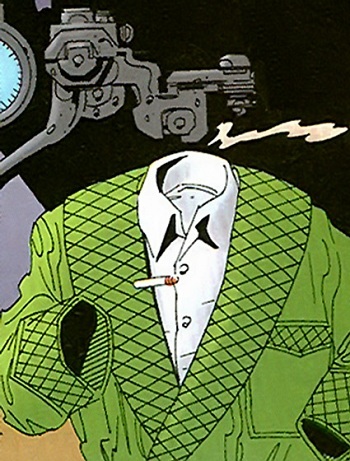
A sociopathic former scientist who managed to create a process to turn himself invisible, which he has used to commit all manner of horrible crimes.
- Actually a Doombot: He survived the events of The Invisible Man by injecting the invisibility serum into a random albino who got killed in his place.
- Adaptational Villainy: Griffin was nowhere near a paragon of virtue in the original book, but this incarnation commits far more heinous atrocities than his literary counterpart ever did.
- Annoying Laugh: A very distinct 'aheh'; used so frequently in the scriptbook accompanying the 'Absolute' edition of the first series, the cover featured a caricature by O'Neill of a suspicious Moore reviewing a script and finding 'aheh' slipped in there.
- Asshole Victim: He is raped and killed by Hyde in Volume II. Given that he himself was a rapist and got a kick out of hurting people, he was asking for it.
- Ax-Crazy: Favors assault over actual murder, presumably because the terror of living victims feeds his ego.
- Combat Pragmatist: Always strikes first often without justification.
- Deadpan Snarker: Understandably, he's the one person not afraid to say exactly what he thinks to the likes of Captain Nemo or Mister Hyde.
- Decomposite Character:
- In the comic's timeline, his original death is explained as him leaving an unnamed man to die in his place.
- In the film, his powers and spot on the team are taken by Rodney Skinner after his death.
- Deconstruction: He's gotten so used to the freedom Invisibility allows that he now considers himself completely immune to consequences. He kills a constable to wear his coat, not caring that it makes him very noticeable, and when Hyde reveals he's always been able to see Griffin, Griffin can only stand there in shock and protest that it "isn't fair".
- Dirty Coward: While the other members of the League fight Moriarty's henchman, he strips to avoid detection and it's implied he was planning to ditch them in the hot-air balloon. Additionally when Hyde reveals he has always been able to see Griffin and starts beating the shit out of him, Griffin can only pitifully grovel and plead.
- Establishing Character Moment: He's introduced taking advantage of his invisibility to rape schoolgirls, including Pollyanna
- Giggling Villain: An already creepy characteristic is made worse by the fact that it seems to be coming from nowhere.
- God Guise: The League find him pretending to be the Holy Spirit so he can have sex with schoolgirls.
- Invisible Jerkass: As an adaptation of the Trope Codifier, you'd expect him to be an unpleasant fellow.
- Invisible Streaker: His Required Secondary Powers do not include invisibility for his clothes, so he tends to go naked.
- It's All About Me: Considers anyone on Earth disposable. This leads to a conflict of interest in Volume II.
- Karmic Death: He pisses off Hyde, who as it turns out, can see him despite his invisibility. He then beats and rapes Griffin to death.
- Karmic Rape: His rape by Mr. Hyde is treated as a fitting punishment, given that he himself was a rapist and it was done in retaliation to harming Mina. May overlap with Pay Evil unto Evil depending on whether you consider Hyde an Anti-Hero or just another villain.
- Kick the Dog: He repeatedly uses his invisibility to do cruel things to other people.
- Laser-Guided Karma: He pisses off the one member of the team who has no qualms about killing him and who can detect him despite his invisibility. It... doesn't end well for Griffin at all.
- Don't worry, "His end was quite comfortable."
- Mad Scientist: In his backstory. Within the series there are far more reliable scientists available to the League.
- Misanthrope Supreme: Humans exist for him to molest, ambush or torment when he pleases.
- The Mole: He spies for the Martians in Volume II.
- Named by the Adaptation: The original book only named him Griffin. Here, he is given the first name "Hawley" as a reference to turn-of-the-century murderer Hawley Crippen.

- Non-Action Guy: He prefers to leave the actual fighting to his team-mates. When he does get his hands dirty, it's in a very sneaky way.
- No Ontological Inertia: His final, agonized death in the library is revealed by a single drop of blood appearing on Hyde's shirt... and then another, and another, until the entire tablecloth where they've been eating dinner is drenched in blood and Hyde's mouth is smeared with gore. Whatever Hyde did to him is terrible enough to drive the battle-hardened Nemo into a rage.Hyde: Huh. I say, that looks rather marvelous, doesn't it? Like a daguerrotype developing.
- The Sneaky Guy: Griffin's M.O. seems to be recon then make a bloody exit.
- The Sociopath: As the quote suggests, he has little empathy for others.
- Stupid Evil: In stark contrast to Hyde, he doesn't fully think the consequences of his misdeeds through. This ends up being his undoing when his assault on Mina drives Hyde to beat and rape him to death in retaliation.
- Token Evil Teammate: It's quite a feat that he's the most unscrupulous member of the group, given his teammates include Nemo and Hyde.
- Verbal Tic: Aheheh. Useful, otherwise the reader wouldn't know he's here.
Murray's Second League (1910-1937)
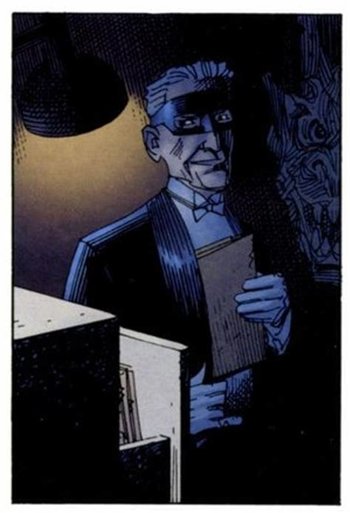
British gentleman thief and cricket enthusiast.
- Adaptation Name Change: Named Anthony, rather than Arthur.
- The Atoner: Raffles admits to Carnacki he's been a "bit of a bastard" in life, and that if war does break out in Europe, he feels he has to enlist to make up for his life of crime.
- Gentleman Thief: Pretty much one of the trope codifiers, along with his French counterpart Arsène Lupin.
- Tuxedo and Martini: Likes to go on missions dressed like this, complete with cigarette holder.
- Unresolved Sexual Tension: With Mina, as the two get along well and even walk away from their meeting with Norton arm in arm, but his death in WW1 and her relationship with Allan and Orlando means they likely never got a chance to act on it.
- We Hardly Knew Ye: Only appears in Century I (aside from being mentioned in supplementary materials), and dies fighting in WW1.
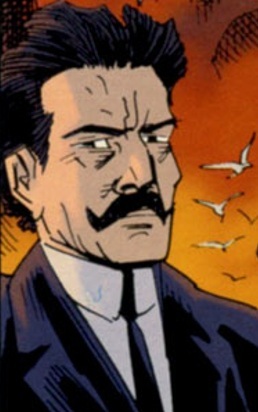
An occult detective, medium and psychic.
- Non-Action Guy: Is too ill and frail to participate in active missions, and instead serves as the team's Mission Control.
- Odd Friendship: He's closer to Raffles than any of the other team members.
- Self-Fulfilling Prophecy: His vision of the first World War led to a series of events that ensured it would come to pass.
- We Hardly Knew Ye: Gets even less screentime than Raffles and dies between Century I and II.
Bio, Bion, Vita, Vito, Roland, La Giocanda, O, Sally Quasar
- Source: Virginia Woolf's Orlando: A Biography but also Roland from the The Song of Roland and other similar legends. Also The Story of O (as O) and Alan Moore's The Ballad of Halo Jones (as Sally Quasar).

Orlando first appeared in The Black Dossier which had a lengthy biography of some of his exploits during his long life of 3000 years. Functionally immortal and capable of changing sex from male and female, Orlando became part of the Power Trio that formed the 20th century League in Vol 3: Century.
- Attention Deficit... Ooh, Shiny!: Prone to going off on tangents about current situations by citing some famous event and personality he witnessed and met in person, which irks Mina and Allan to no end.
- Been There, Shaped History: He's the son of Tiresias the Blind Prophet and he's met everyone and anyone of consequence in literary and cultural history for over 3000 years.
- Berserk Button: Is furious when she finds out James Bond blew up the Fountain of Youth. He's also furious at anything that insults the memory of his former lover Sinbad the Sailor, who he described as his One True Love even thousands of years later.
- Blood Knight: Orlando is very refined and culturally sophisticated but is also very good at war, having fought in major conflicts from The Trojan War in The Iliad to The War on Terror in the 21st century.
- Cool Sword: THE Cool Sword, Excalibur, which (s)he filched from King Arthur's corpse after he was killed by Mordred. It's also Durandal, and Orlando himself is in fact Roland.
- Deathless and Debauched: Born in 1260 BC and has spent most of the time since gaining immortality pursuing excitement and pleasure. When not participating in whatever conflict excites them the most, they indulge heavily in carnal pursuits, racking up a huge tally of male and female lovers over the millennia... and when not busy shagging their way through history, they still find the time to indulge in alcohol and clubbing.
- Deconstructed Character Archetype: Orlando is a deconstruction of the immortal Been There, Shaped History fantasy archetype. Despite living long and seeing and doing much, he isn't necessarily advantaged over the likes of younger characters like Prospero or Mina Murray, and is even challenged by the likes of Oliver Haddo and the Moonchild. Being immortal has frozen him into the eternal 20s.
- Forced Transformation: Spent some time as a Marmalade Cat, a reference to the Orlando and the Marmalade Cat children's books by Kathleen Jane.
- Fountain of Youth: Ayesha's fountain is what made them immortal.
- Gender Bender: Like his father Tiresias of Thebes, cursed by the Gods to change his sex for a brief period, Orlando changes his sex from male to female involuntarily. In 2009, he comes back from Qumar and finds herself changed when she undergoes her period.
- The Hedonist: As part of his attempts at keeping his/her immortal life interesting, Orlando has indulged in nearly every sexual act known to man.
- I Have Many Names: His birth name was Bio and he later became Bion, then Vita, Vito and eventually Roland before swearing to remain "Orlando for all my days." She picks up the name Sally Quasar in the distant future.
- Immortality Promiscuity: A 3000+ year old immortal who's hit it off with anything that moves and knocked boots with a number of famous figures.
- Living Forever Is Awesome: He proudly holds the belief that his immortality has its advantages. Cracks are beginning to show by the 20th century however.
- Made a Slave: Was sold into slavery very early in life by her father Tiresias, because he couldn't stand being reminded of the gender-bending curse Orlando had inherited from him. Across the millennia, Orlando would be a slave several more times (kind of unavoidable considering the kind of cultures that existed in those days).
- Really Gets Around: As a side effect of his/her immortality, Orlando has become VERY well versed in human sexuality. If his own accounts are true, he's been involved with Ramses II (though not exactly by choice), Aeneas of Troy, Romulus (and Remus, there was a bit of a mixup there), Sinbad the Sailor, Merlin, Hsi Wang Mu, Percy and Marguerite Blakeney, and many many many more.
- Shell-Shocked Veteran: Becomes this in Century: 2009 after going crazy and blindly shooting in a patrol that killed several innocent civilians and comrades. The army thinks it was an act of heroism and he gets a medal but Orlando is appalled at what happened, even more so it happened in the land of Arabian Nights, where his lover Sindbad had once lived in the Middle Ages.
- Space Pirate: Works alongside Jack Dakkar in 2164 and Satin Astro says a man called Orlando is a notorious space pirate in the 30th century.
- Undying Warrior: Has spent most of their history as either a committed hedonist or an insatiable Blood Knight. In the case of the latter, Orlando took up arms in the Peloponnesian War, fought on behalf of the Roman empire, became known as Roland, participated in the third Crusade, fought in both World Wars, and has become a member of numerous iterations of the League across history. As of Century: 2009, they've even participated in The War on Terror before returning home as a Shell-Shocked Veteran after committing a massacre of both enemy combatants, civilians, and their squadmates.
- Unreliable Narrator: It is difficult to know exactly how many of his exploits are true, as
 Word of God has stated that Orlando is a compulsive liar.
Word of God has stated that Orlando is a compulsive liar.
Prospero's Men (1610-1696)
Johannes Subtle
- Source: William Shakespeare's The Tempest and Ben Jonson's The Alchemist (for his Johannes Subtle identity).
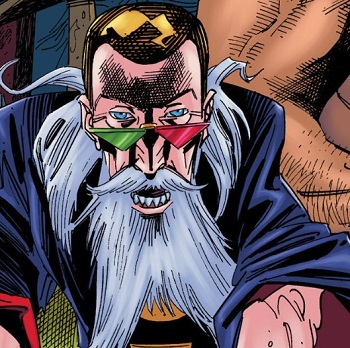
The exiled Duke of Milan was secretly employed by Queen Gloriana and tasked to found the first League. He eventually retires to the Blazing World and serves as an adviser to later iterations of the League.
- The Ace: Orlando, usually full of himself and/or herself, considers Prospero the greatest magician he ever met.
- Adaptational Villainy: His master plan is to release the fantastical creatures of the Blazing World back into Earth, turning the planet into a dystopia as they overrun humanity. He also manipulates the Moon's inhabitants into conquering Venus and Mars, setting up a tyrannical interplanetary empire destined to last for at least a millennium.
- All There in the Manual: He makes brief on-panel appearances in The Black Dossier and Vol 3. Century but he's a prominent presence in the expanded lore.
- Antiquated Linguistics: Speaks in Shakespeare's iambic pentameter. Shakespeare is his biographer. Amusingly, he continues to call Orlando his "squire" well into the 21st Century.
- Ascend to a Higher Plane of Existence: What he eventually did, leaving the mortal plane for the Blazing World, an extra-dimensional world where all of fiction becomes ageless and immortal.
- Berserk Button: He's usually calm but Orlando's laziness and general disinterest in century-long quests makes him raise his many-ringed index finger in outrage.
- Big Bad Duumvirate: With Gloriana in The Tempest.
- Big Good: Occupies the role of highest-ranking authority figure for the League as a whole, well into the 21st century. Later subverted, as he reveals to be using the League as part of a centuries-long plan of returning the world's magics and fantasies at the cost of ending human civilization.
- Breaking the Fourth Wall: His Character Filibuster at the end of The Black Dossier essentially has him admit to knowing the true nature of the entire series and directly address the readers on the theme of the series, namely that fiction inspires reality as much as reality inspires fiction. This recaptures the spirit of his famous closing soliloquy at the end of The Tempest.
- Demoted to Extra: Despite being the reason for the League's existence, and being the driving force behind the plot of the Black Dossier, he only makes two brief appearances during the last chapter of Century to get Orlando to resume her search for the Moonchild, and doesn't even appear to support the remnants of the League during their final battle.
- Face–Heel Turn: Midway through the final volume, he unleashes the monsters of the Blazing World onto the mundane nations of man.
- Go-Karting with Bowser: Is seen briefly communicating with Nyarlathotep in his Crawling Chaos incarnation on fairly even terms, which unnerves Mina.
- Happily Married: To Doll Common. Her death saddened him greatly.
- I Have Many Names: While staying in England, Prospero takes the name of Johannes Subtle, the titular Alchemist from Ben Jonson's play. He marries another character (Doll Common) from the same play.
- No Historical Figures Were Harmed: In Moore's vision, Prospero is one for the famous John Dee, Elizabethan occultist.
- Our Founder/The Leader/The Mentor: He's the founder and leader of the original league and served as The Mentor to Orlando despite the former being two thousand five hundred years older than him. He serves as one to Mina and Co. as well.
- Time Rewind Mechanic: Is able to rewind time to restore the Blazing World after James Bond nukes it.
- Well-Intentioned Extremist: Volume IV reveals Prospero has been working with Gloriana for five centuries to bring back the world's magics and fantasies that were once banished by humanity. They plan to do this by unleashing supernatural horrors and monsters that will end human civilization.
- Wizards Live Longer: Has gained immortality due to living in the Blazing World.
- Source: The Tempest

Magical familiars conjured up by Prospero, serving as his bodyguards and assistants. Caliban is a massive, powerful ogre-like brute, while Ariel is a "sprite of Air", a fairy-like being. Being magical creatures, they do not age.
- Ambiguous Gender: Ariel has a very feminine face and name, but lacks breasts, not to mention his/her Barbie Doll Anatomy. Being a magical creature probably makes gender moot anyway.
- Big Guy, Little Guy: Caliban's Big Guy to Ariel's Little Guy.
- Immortality: They, like Prospero himself, never grow old.
- Non-Human Sidekick: They are both this.
- Source: Don Quixote by Miguel de Cervantes
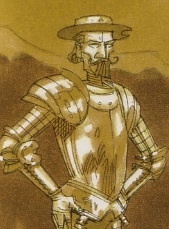
A Spanish nobleman and adventurer who became obsessed with stories about the knights of old, and set out to become one himself.
- Adaptational Badass: While he wasn't quite as incompetent in the original novel as pop culture likes to think, he's a far more accomplished warrior here. Not a small feat considering that, unlike the novel, the League's world is full of actual giants and monsters.
- Adapted Out: His "squire", servant and chronicler Sancho Panza is nowhere to be seen in the League world.
- Red Baron: "The Man from La Mancha".
- Younger and Hipper: Based on the illustrations, this version is still in his prime rather than the middle-aged man he was in the novel.
- Source: The Pilgrim's Progress by John Bunyan
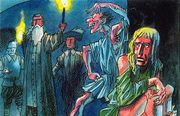
A mysterious mute rescued by Prospero from a London madhouse in 1678, Christian is not a normal human, but instead originates from a strange, allegorical world corresponding to the Judeo-Christian religion.
- Ascend to a Higher Plane of Existence: How Christian eventually returns to his own world.
- Bedlam House: Was locked up in one of these because of his mutism and strange behavior.
- Teeth Clenched Team Work: One-sided on Christian's side, he is not happy at all with working for Prospero due to him being a sorceror, which is a big no-no in Christianity, but has little choice in the matter since Prospero is the best chance he has to find a way home. He's not particularly hostile about it, though.
- Trapped in Another World: This is what happened to Christian during his pilgrimage. During his journey to the City of Destruction, Christian suddenly found himself in London in the 1670's, with no way to return to his own realm.
- The Voiceless: According to Prospero, Christian has never spoken during their entire partnership. He's surprised when Christian becomes Suddenly Voiced before disappearing into the Blazing World, telling Prospero to "follow me".
- Source: The Floating Island by Richard Head
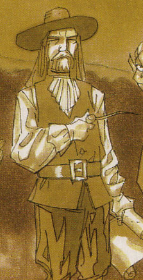
An impoverished ship captain who spends most of his time at sea to avoid his creditors. Serves as the main transport for Prospero's League.
- Cool Ship: Owned three ships, the Pay-Naught, the Excuse and the Least-In-Sight.
- Deadpan Snarker: His logs in The Traveller's Almanack contains quite a bit of snark about the locations he visits. Fitting as the novel he comes from was a parody of adventure stories.
- Perpetual Poverty: Just look at his name.
- "Shaggy Dog" Story: Assisted Prospero throughout the entire duration of his League, including transporting him on the final journey to the Blazing World... only for Owe-Much to realize after Prospero has disappeared that the wizard never actually paid him for his services, and he's just as broke as he was at the start of their team-up.
- Source: Forever Amber by Kathleen Winsor

Born the illegitimate daughter of the Earl Of Rosswood, Amber St Claire is a courtesan well-versed in the intrigues and power plays of the British aristocracy, and uses her sexuality as a weapon.
- Dirty Old Woman: Reappears in the memoirs of Fanny Hill, where she's now well into her 70's, and running a brothel.
- Heroic Bastard: Though her parents were supposed to be married, their engagement was broken up by their families taking different sides during the English Civil War. However, before being split up, they slept together, and Amber's mother Judith died in childbirth while using a false name. Amber herself was raised by the Goodegroome family with no idea about her true origins.
- Honey Trap: During her relationship with the highwayman Black Jack, she'd lure rich targets to a secluded spot with this tactic, where Jack would rob them.
- Really Gets Around: Uses her beauty and sexuality to manipulate the rich and powerful.
- The Smurfette Principle: The only female member of Prospero's League, and with little to no combat abilities.
- What Happened to the Mouse?: Had three children over the course of the novel, with her oldest son born very early on in the story. None of them are even alluded to.
- Writing Around Trademarks: Her name in the novel is actually St Clare, but like Tom Swyfte and Jimmy, the minor name change exists to avoid copyright.
Gulliver's Fellowship (1740-1799)
- Source: Gulliver's Travels by Jonathan Swift
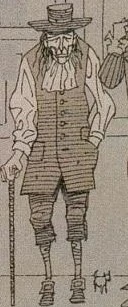
An elderly ship captain, adventurer and former surgeon, Lemuel became the leader of the 18th-century incarnation of the League after a lifetime of voyaging around the world, especially the then-largely unexplored islands around America and Asia.
- Cool Old Guy: Despite being well into his 80's by the time the League is formed, he remains an accomplished, skilled adventurer. While he's not as badass as the younger members, he still actively participates in some very dangerous missions such as the Giant Wars.
- Dirty Old Man: Still very appreciative of women despite his age, and in fact dies during a sexual encounter with Orlando.
- Due to the Dead: After his death, the League fulfills his last request and brings his body back to Lilliput, where his grave becomes a grassy hill for the tiny populace to lounge on.
- Father Neptune: Still an experienced, fearless sailor despite his old age.
- Giant Corpse World: He specified that he wanted his body brought back to Lilliput to become one of these, though unlike most uses of this trope, he meant for his grave to become a grassy hill for the tiny inhabitants to use rather than just dumping his corpse in plain view, making this example a lot less morbid. The rest of the League follow his last wishes.
- Out with a Bang: Dies while having sex with Orlando, presumably from the strain.
- Time Dissonance: Is somewhat distressed to discover this to be the case for the Lilliputians when the League visits them, as it appears much more time has passed for them than for Gulliver and it's been generations since his original visit. As such, they either have no memory of him, or his visit is just legends to them, leading to understandable panic among the population when a group of giants show up. Their second visit is more successful, but by that point, Gulliver himself has died.
- Source: The Scarlet Pimpernel by Baroness Emma Orczy
A married pair of wealthy English aristocrats, the Blakeneys operated in secret during the Reign Of Terror of the French Revolution, helping French nobles escape the guillotine. Despite his foppish air, Sir Percy is in fact the civilian identity of masked adventurer The Scarlet Pimpernel.
- Action Girl: Marguerite. Unlike the original stories, she now follows her husband into battle.
- Battle Couple: Fight alongside each other as part of the team.
- Happily Married: One of the few couples to take part of the League, and the only ones who were officially married.
- Heroic BSoD: Percy has one of these when he finds out that some of the nobles he saved during the Reign Of Terror are the degenerate monsters from 120 Days Of Sodom. He openly regrets having ever saved them from execution.
- Three-Way Sex: Percy and Marguerite become very close with Fanny Hill.
Captain Clegg, The Scarecrow
- Source: Doctor Syn: A Tale Of the Romney Marsh by Russel Thorndike
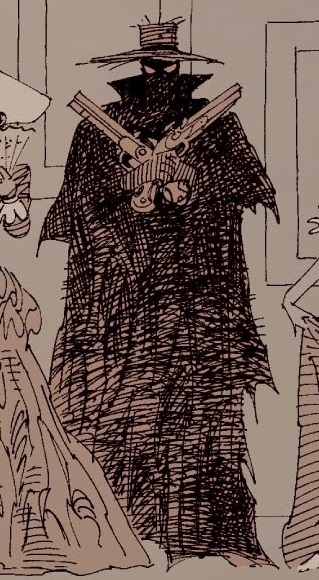
A vicar turned pirate turned smuggler, Christopher Syn embarked on a double-life of crime when his wife eloped with one of his closest friends, leading to a series of events that caused Syn to take on the identity of Captain Clegg, and, after abandoning the Clegg identity, settled down in Kent as the country vicar, only to begin living a double life as the masked smuggler The Scarecrow.
- Anti-Hero: Did some really shitty things both as Captain Clegg and the Scarecrow.
- Cool Old Guy: Is in his mid-60's as a member of the League.
- The Cowl: As the Scarecrow.
- Guns Akimbo: As the Scarecrow, Syn uses two pistols.
- Just Like Robin Hood: Began his activities as the Scarecrow to help the township he lived in avoid the government's oppressive taxes on foreign goods.
- Source: Memoirs Of a Woman Of Pleasure by John Cleland
Famed in-universe for her sexual exploits as detailed by author John Cleland, Fanny Hill is a former high-class prostitute who by chance found herself involved in the strangeness of the League after her marriage came to an abrupt end.
- Already Met Everyone: Not all of them, but before her Time Skip, Fanny had one-night-stands with then-middle aged Gulliver, and Dr Syn in his Captain Clegg identity.
- Ethical Slut: Very promiscuous, and very moral and good-natured.
- Extreme Omnisexual: Goes far beyond the original novel's raunchy content, which mostly stuck to monogamous, heterosexual encounters (with one lesbian one). In this version, Fanny happily engages in threesomes, lesbian orgies, and even sex with non-humans such as the subterranean Vril-Ya.
- Happy Ending Override: Unlike the novel which was told in retrospect by a happily married middle-aged Fanny with children, The Black Dossier reveals her marriage fell apart when she discovered her husband Charles had cheated on her multiple times with Amber St. Clare's prostitutes.
- Living Forever Is Awesome: While living in the magical realm of Horselberg (from The Story Of Venus and Tannhäuser), Fanny ages very slowly, and ultimately returns there at the end of the League's adventures, so she'll never grow old. The end of The Black Dossier reveals she's still alive and young as of the 1950's.
- Time Skip: Inadvertently experiences one, due to the strange way time works in Horselberg. While to her, it seemed only a few months had passed, in reality decades passed in the outside world. As a result, by the time she meets the League, she finds her former lovers Gulliver and Dr Syn are well into old age.
- Three-Way Sex: With Percy and Marguerite, they're almost the Official Couple of this incarnation of the League.
- Source: Leatherstocking Tales by James Cooper
Raised by Native Americans, "Hawkeye" Nattie Bumppo is an accomplished frontiersman, hunter and marksman, and veteran of the Indian Wars.
- Egomaniac Hunter: To the point that the other League members have to stop him from shooting rare and beautiful animals during their travels.
- The Friend Nobody Likes: Fanny Hill notes that Bumppo is kind of a dick.
- Improbable Aiming Skills: One of the best marksmen in fiction.
- Mighty Whitey: To an uncomfortable degree.
- Red Baron: "Hawkeye", "Pathfinder".
- What Measure Is a Non-Human?: The New Traveller's Almanack reveals he killed a few intelligent humanoid animals for sport during the League's travels, forcing the group to flee before the crime was discovered.
Warralson's League (1946-1947)

- Source: Worrals series by W.E Johnson
Captain of Britain's Women's Air Force, recruited by MI5 to lead a League to replace Murray's, which ended up folding after only one mission.
- Ace Pilot: Why she was chosen to lead.
- Adaptational Sexuality: She's a lesbian here, which was not stated in the original stories, although she always did refuse the advances of men.
- Adaptation Relationship Overhaul: She ends up settling down with companion, Betty "Frecks" Lovell, who she was only friends with in the original stories.
- Butch Lesbian: She is one for the time period, doing traditionally "masculine" things like being a pilot.
- Hide Your Lesbians: She had to keep her sexuality on the down-low, given the time period.
- Suspiciously Similar Substitute: In-universe: She was meant to be a replacement for Mina.
- Writing Around Trademarks: Her name is spelled Warralson instead of the original Worralson.
Agent of British Intelligence who fought in Afghanistan. His father is William Samson Senior, who assisted Murray's League during the Martian Invasion.
- Grandfather Clause: In-universe: He tries to hit on Warralson in order to recreate the Quatermain/Murray relationship. It doesn't work, see below.
- Sorry, I'm Gay: His attempts to get together with Warralson fail because she's a lesbian.
- Suspiciously Similar Substitute: In-universe: He was meant to replace Allan Quatermain.
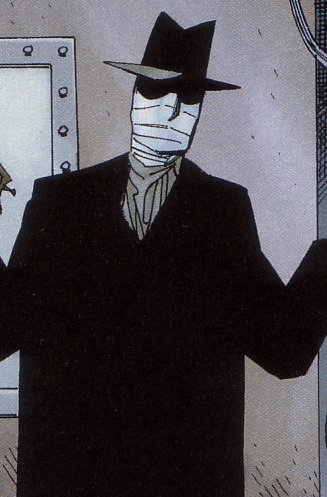
A British scientist. Unlike his counterpart Griffin, he became invisible by accident.
- Good Smoking, Evil Smoking: He chain-smokes.
- Hoist by His Own Petard: Frequent, see the entry for Mr. Vice Guy.
- Invisibility
- Mr. Vice Guy: While he is much nicer than Hawley Griffin, his chainsmoking is his vice. It causes him to frequently cough and give himself away, making for an ineffective invisible man.
- Suspiciously Similar Substitute: In-unverse: He was meant to correspond to Hawley Griffin in Murray's League.
A genius scientist who built a versatile submarine called the Iron Fish.
- Adaptation Origin Connection: He was inspired to build the Iron Fish by Nemo and the Nautilus.
- Captain Nemo Copy: In-universe: He was meant to be the equivalent of the Murray League's Captain Nemo.
- Early-Bird Cameo: Prior the formation of the Warralson League, he appeared as a child in Volume II during the Martian Invasion, being rescued by Nemo after his parents were killed. Nemo's submarine inspires him to build his own someday.
- Gadgeteer Genius
- Sub Story: The Iron Fish is his most useful invention.
- Super Hero Origin: In Volume II, as a child, he and his parents were on a train that was crashed into the Thames during the Martian Invasion. His parents were killed, but he was rescued by Nemo. Nemo's submarine inspires him to build his own someday.

A prototype robotic man created by Rodney Dearth. Used to find treasure in Africa before it was brought into the League.
- Epic Fail: The Warrior was in such disrepair by the time it was brought into the League that it spontaneously exploded during their first mission, aborting the whole thing.
- Mecha: One of the earliest examples in fiction.
- Powered Armor: It can function as this if necessary.
- Super-Strength: The specific reason it was brought into the League, to replicate Hyde's strength. Unlike the other members, the Warrior doesn't fall under Suspiciously Similar Substitute because strength is all they have in common, and the text even refers to recruiting the Warrior as "faintly desperate".
- We Hardly Knew Ye: He explodes during this League's first and only battle.
Associates

- Source: John Carter of Mars series by Edgar Rice Burroughs
A veteran of the American Civil War, having been a captain on the side of the Confederacy, John Carter was hiding from a band of Apaches in a cave when a mysterious force seemed to draw him out of his body. He soon found himself on Mars, where he would become embroiled in many adventures over the coming years. However, his journey would be interrupted mid-transport by a terrifying event he forgot upon his arrival on Mars.
- Adaptational Modesty: Is fully clothed as opposed to wearing loincloth armor like his book series.
- Expy Coexistence:
- He's thought to have been based on Gullivar Jones. The two of them appear together on Mars in Volume II.
- In a bit of deliberate irony, the later Michael Kane from Moorcock's Kane of Old Mars, also inspired by Carter, is mentioned to have been a traveler from the third planet that visited Mars millennia ago and established the Kane Dynasty. Carter and Jones, not knowing the circumstances of his time travel, speculate that he was likely a native Martian and it was "probably coincidence" that he had an English-sounding name (which may also be an oblique reference to another Martian that does have one).
- Laser-Guided Amnesia: Like the others, John Carter has no recollection of the events of The Sundered Veil.
- Lawyer-Friendly Cameo: Is only referred to as "John" rather than his full name, as the character is still under copyright in Europe.
- The Lost Lenore: It's implied before the events of Volume 2, Dejah Thoris died. John is understandably saddened when Gullivar Jones gives his condolences.
- Related in the Adaptation: To Randolph Carter.
- Whole Costume Reference: To Prince Faisal in Lawrence of Arabia.

- Source: The Statement of Randolph Carter and other works by H. P. Lovecraft
A native of the infamous town of Arkham, Randolph Carter is an antiquarian and former student at Miscatonic University. Throughout his life, Carter has found himself dragged into many terrifying events involving forces from beyond reality, experiences which have left him a neurotic wreck.
- Laser-Guided Amnesia: Neither he nor Quatermain remember their encounter during The Sundered Veil when they meet in the real world in 1899, aside from a strange feeling of familiarity.
- The Load: Is the least helpful of this League.
- Non-Action Guy: Despite being a veteran of the French Foreign Legion, Carter is meek, cowardly and in-assertive, much to the disgust of his ancestor John Carter.
- Related in the Adaptation: To John Carter.
- Shell-Shocked Veteran: His encounters with the paranormal have made him resemble this.
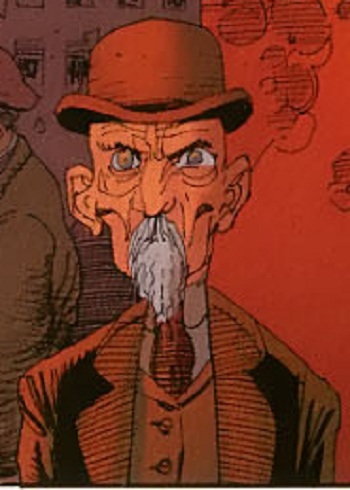
An elderly French detective who comes out of retirement when a former case of his reopens. Prostitutes in the vicinity of the Rue Morgue are being killed by what is described as a large, ape-like creature.
- Ascended Fanboy: He stares in awe at the Nautilus and hints to Mina that he read Dracula, praising her courage.
- Cool Old Guy: A diminutive centenarian. Doesn't stop him from shooting an antiquated pistol at point blank range at Mr. Hyde the moment he appears, while Allan Quatermain is too busy being knocked out.
- Death Glare: Gives a piercing one to Allan when he sees the latter with the bottle of absinthe, realizing why Mina disappeared without Allan noticing anything. This is immediately followed by Dupin giving Allan a What the Hell, Hero? as mentioned below.
- Expy Coexistence: He's considered to be the inspiration for Sherlock Holmes who exists in this universe.
- French Jerk: Totally averted. Indeed he's one of the most respectful treatments of original creations in the volume. A wonderful gentleman with good manners who treats Mina without judgment and condescension.
- Great Detective: The original.
- Miniature Senior Citizens: He's rather short.
- Public Domain Character: He's yet another character Alan Moore was allowed to use because he originated from 19th century literature.
- What the Hell, Hero?: Subjects Allan to a very justified one when he abandons his watch on Mina to get a bottle of absinthe."Monsieur, you are both a weakling and a fool!"
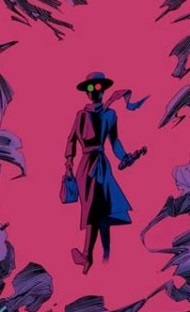
The mysterious aid to the League against the Antichrist in Century.
- Badass Boast: Gives out a string of these as she's facing off with the Antichrist:The Antichrist: Who the fuck are you?
Mary Poppins: I have a great many responsibilities. Foremost among these, however, is my concern for the children. I am concerned regarding their wellbeing, and the healthy development of their imaginations. I am concerned regarding their behaviour... And I'm afraid, young man, that I don't care for you at all.
The Antichrist: I'm well famous, actually. I'm in a book of the Bible!
Mary Poppins: Tsk. Just one book? I'm on every page. Who did you think you were talking to?
I rocked the fretful baby gods to sleep before time started... and I am companion to the women who paste up the stars. The quarters of the world bound unto my compass. I have taken tea with earthquakes. I know what the bee knows... and you really are a dreadful little boy. - Big Damn Heroes: Swoops in to help stop the Antichrist in 2009.
- Chekhov's Gunman: Briefly appears in the Blazing World in Black Dossier.
- Curb-Stomp Battle: Gets one against Harry Potter. Yes, really.
- Deus ex Machina: Shows up to defeat the Antichrist when the heroes have no way of stopping him.
- Humanoid Abomination: A rare benevolent example.
- Physical God: Is implied to be a physical incarnation of the God.
- Reality Warper: Can change the fictional world around her, up to and including turning the Antichrist into a chalk drawing.
- Sdrawkcab Speech: Talks like this when she appears in the Blazing World.
- Writing Around Trademarks / Lawyer-Friendly Cameo: Is only ever called "Mary".
A beatnik descendant of Professor Moriarty, who Allan and Mina encountered in the U. S. in the 1950s.
- Crossover Relatives: He's related to Professor James Moriarty.
- The Cuckoolander Was Right: Turns out to have been right about the Great Old Ones' plot.
- Grandfather Clause: In-universe, his rivalry with Doctor Sachs is because of his grandfather's rivalry with Fu Manchu, Sachs's grandfather.
- No Celebrities Were Harmed: As in the source material, he is a stand-in for beatnik cultural figure Neal Cassady.
- The Rival: To Doctor Sachs, their grandfathers' rivalry having become something of a tradition.

A surgeon who conducts unethical experiments where he transforms animals into grotesque human hybrids. He plays a major role in Volume II, where he creates a hybrid bacterium of anthrax and streptococcus to kill the invading Martians.
- Affably Evil: Deranged he may be, but he's as cordial as can be to Allan and Mina.
- Mad Scientist: He creates hideous animal men and is confused as to why people would be repulsed by his work. He's also a pioneer in the field of biological warfare, having extended his obsession with fusing species to bacteria and viruses.
- Historical In-Joke: He mentions having a nephew named Gustav
 who paints pictures of his creations and refers to them as "chimera".
who paints pictures of his creations and refers to them as "chimera". - Motherly Scientist: He refers to his creations as his own children.
- Named by the Adaptation: He did not have a first name in the original novel.
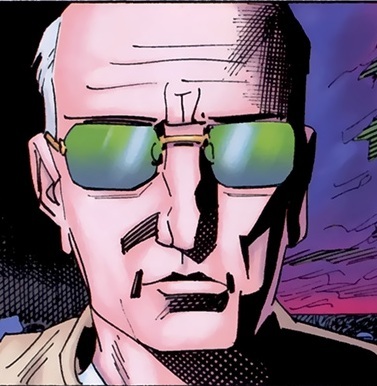
Andrew Norton is the Prisoner of Time, a figure trapped in a fixed location in space (the city of London and its suburbs) but can visit the city at any point in time, past, present and future. This allows him to interact with the League over several different centuries across time.
- Author Avatar: He's drawn to resemble his creator, Iain Sinclair.
- Breaking the Fourth Wall: He does this throughout all his appearances, which greatly disconcerts Mina and Orlando, specifically addressing their fictional nature (even going so far as to tell them he enjoyed Volume 2). In 1969 he discusses life of Donald Cammell, who directed Performance, whose characters are real figures in the story we are reading and also talking, like author Iain Sinclair about the real-life coincidences and associations of King's Cross stationnote including the "Franchise Express" gathering steam a quarter over platform ten and the fact that it served as the location of an opium den for Johnny Depp.
- Britain Is Only London: For him it's a literal trope, as he is trapped in London and its suburbs physically but can visit the space in any point of time. This is the reason he doesn't accompany Orlando and Mina when they visit Hogwarts in Scotland.
- Future Slang: His appearances throughout history, his 20th-century trenchcoat and modern spectacles make him stand out in pre-modern times but then he opens his mouth and speaks in a very contemporary syntax with multiple cultural references that are outside the comprehension of 19th Century Characters like Mina.
- The character has a lot in common with Doctor Manhattan, in that he seems to experience all of the history of London at once on a quantum level. Past, present, and future all seem to bleed together for him. His dialogue indicates random references to things that either have happened or will happen.
- Ominous Message from the Future: He delivers this to Mina and Co. over the course of Vol. 3, first in 1909 and 1969. First time, it's far too cryptic and Reference Overdosed. Second time it's even more ominous, even telling them when they meet again in 2009, it will be too late. He's right.
Beatnik author and best friend of Dean Moriarty, he encountered Mina and Allen in the 1950s.
- Beatnik
- I Should Write a Book About This: He ends up chronicling his, Moriarty's, Mina's, and Allan's battle with Doctor Sachs in a beatnik novella called The Crazy Wide Forever.
- No Celebrities Were Harmed: As in the source material, he is a stand-in for beatnik author Jack Kerouac.
- Writing Around Trademarks: Here, his name is spelled Sal Paradyse instead of Paradise.

An alien adventurer, airship pilot and former slave. He usually appears alongside his lovers, the Dutch Dolls, a pair of artificial humanoids originating from Toyland.
- Adaptation Species Change: Galley-Wag is based on the shockingly offensive children's book character Gollywog, but in this version isn't even human, explaining his bizarre proportions and inhuman behavior.
- Blaxploitation Parody: Possibly the angle Moore was aiming for. Superficially an overblown caricature of a black person, but also a cool high-flying secret agent who has lots of sexualized adventures and gets to make a fool of racist hick Barney Fife.
- Cool Ship: Serves as team transport for the surviving League members after the 1930s using his balloon ship which can even travel into space.
- Big Damn Heroes: Rushes to the defense of Mina and Allan when they're almost cornered by Jimmy Bond and Emma Night, knocking both agents out flat with his roar. Bulldog Drummond only avoids the same because he was falling behind.
- Bizarre Alien Biology: Supplementary material in Century reveals Galley-Wag's race is essentially living dark matter, meaning they're enormously heavy and dense.
-
 Fair for Its Day: His personality is actually pretty in line with how he was portrayed in the original books, heroic and personable.
Fair for Its Day: His personality is actually pretty in line with how he was portrayed in the original books, heroic and personable. - Fictionary: He is, roughly, speaking English, but with frequent elaborate malapropisms and spliced with some vaguely nautical slang. "Bread and Tits! Let the thrup of us entender withdoors!" note
- Humanoid Abomination: A rare heroic example, the Galley-Wag's design is taken directly from the old racist "gollywog" toys with their bushy hair, giant lips and grotesque proportions. Justified since, unlike the Gollywogs which were just racist caricatures of Africans, the Galley-Wag isn't human at all.
- Made a Slave: Born a slave actually, Galley-Wag was born into slavery on a space galley ship, eventually escaping when he reached adulthood.
- Make Me Wanna Shout: Has an incredibly destructive roar he uses as a weapon that can deafen and even knock people out, even at a distance.
- No Name Given: Presumably his name isn't really Galley-Wag, but it's doubtful his former masters even gave him a name. "Minions of the Moon" reveals he was called "Jackboy Sixty", which sounds more a designation.
- Only You Can Repopulate My Race: The Amazon Moon Women that appear in the Century supplementary stories about Mina's activities between chapters mention they had hoped to ask the Galley-Wag to help repopulate their race due to all the men dying off from a plague. Unfortunately, despite being humanoid and perfectly capable (and willing), he isn't biologically compatible with them.
- Source: The Time Machine by H. G. Wells
A mysterious man who uses a machine he invented to travel through time. He assembles a small league of his own to defend the Earth from some of the Great Old Ones.
- Astral Projection: How he summons Allan and the others.
- Entertainingly Wrong: His original assumption, that the Morlocks were evolved from humanity, was this. He now knows that they are actually the Mi-go, servants of the Great Old Ones.
- Hero of Another Story: Somewhere outside of linear time, he's working to prevent the Great Old Ones from invading the League universe.
- Mysterious Past: The others aren't around long enough to find out about where he comes from.
- No Name Given: As in the book he originates from, his name is never revealed.
- Only Sane Man: Allan is so drugged up that he doesn't care anymore, and John and Randolph are too busy bickering and distracted by their own journeys, leaving him the only one really concerned about defending the Earth.
- Time Machine: Uses the Trope Codifier.
- Uncertain Doom: His fate after his League abruptly disbands is unknown, only that according to his novel of origin, he never returned to his own time.
